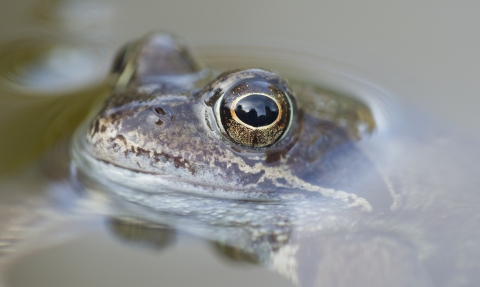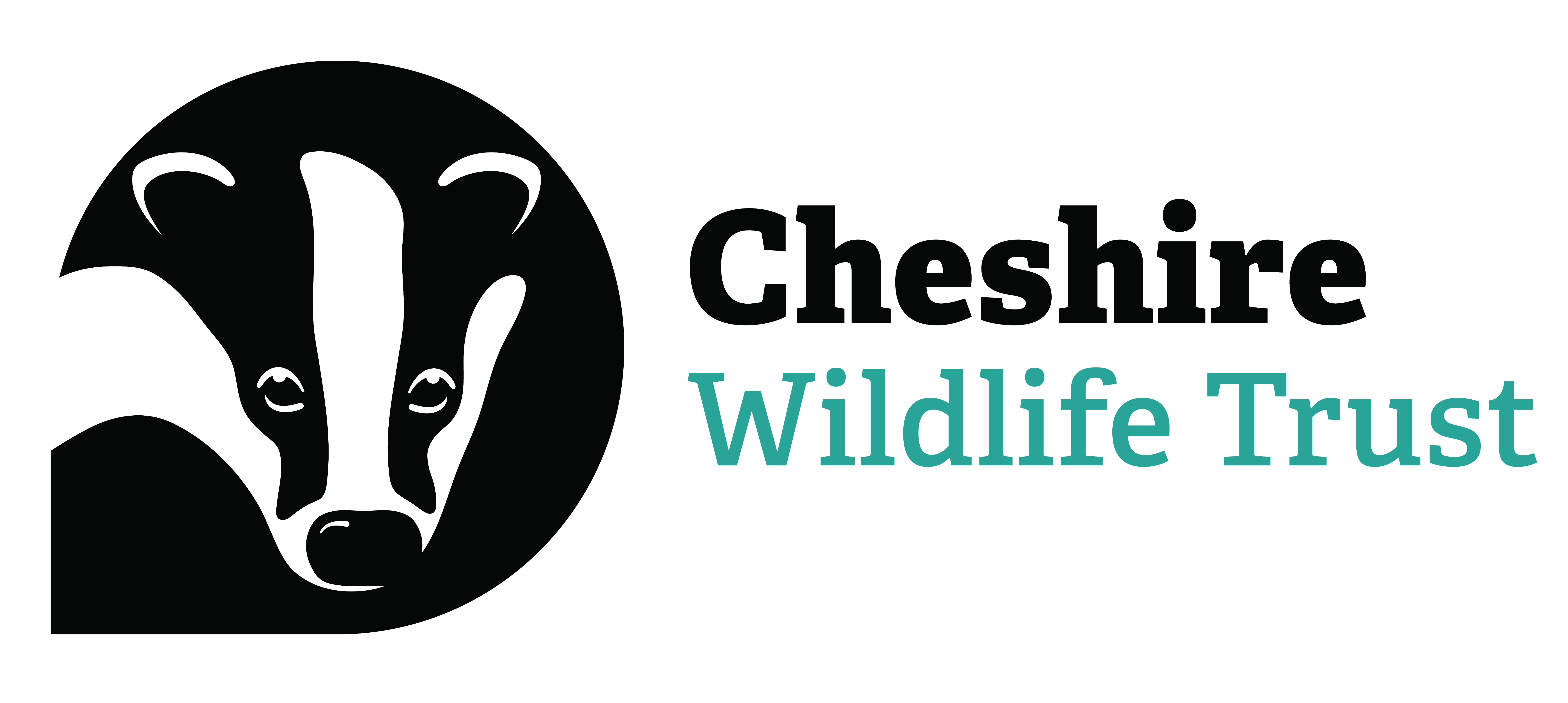
Frog c. Mark Hamblin/2020VISION
Wildlife advice
Whilst we aren't able to deal with animals ourselves, we do have advice below on where to get help if you're not sure who to contact.
What do I do with injured wildlife?
The Trust does not deal with injured wildlife. Casualties can be taken to:
RSPCA Stapeley Grange Wildlife Hospital,
London Road, Nantwich
Telephone 0870 4427102
or
Lower Moss Wood, School Lane, Ollerton, Knutsford, Cheshire, WA16 8SJ
Telephone/fax 01565 755082
If you find a fledgling which appears to be abandoned please leave it alone. Generally the parents are close by, and will return to feed it as soon as you move away. Only if the young bird is still alone after several hours, or is obviously injured, do you need to take action.
What should I do if I find a baby bird on the floor?
In spring and summer, it's very common to see baby birds hopping around on the floor, seemingly on their own. Do not pick them up or move them. There's no need to be worried, as this is normal and how birds learn to begin fending for themselves before flying away from their parents.
Just because you cannot see the adult birds does not mean that they are not there. The parents are probably just away collecting food - or are hidden from view nearby keeping a watchful eye, or even being frightened away from their youngster by your presence. Fledglings should be left where they are, in the care of their own parents.
If you are worried that the bird is in danger, please contact the RSPCA to ask for their advice before touching the bird.
There's too much frogspawn in my pond
Please do not move spawn between ponds, as this can transmit diseases. However crowded your pond may appear this is natural. Many animals feed on tadpoles, and numbers will be reduced to no more than your pond can support. To find out more about amphibians in gardens contact Froglife.
What to do if you see a polecat
Polecats have re-colonised most of Cheshire in the last 20 years. We are still interested in all sightings. To report a sighting visit www.record-lrc.co.uk
How can I stop badgers digging in my garden?
This is almost impossible, badgers are strong enough to break through most fences. They are digging to find buried insects, this is generally short-term, and they will forage elsewhere as food becomes available in the countryside. For more information contact Cheshire and Wirral Badger Group.
When is the best time to clear out a garden pond?
Garden ponds accumulate dead plant material and other detritus over time and you may want to clear it out every few years (annual cleaning out is generally not needed). The best time is late autumn, after tadpoles have metamorphosed and left the pond, and before pond creatures become dormant before the winter. If you can leave a small section of the pond un-cleared this can act as a refuge for pond life to shelter in.
The water level in my pond is low should I top it up?
Water levels normally drop in the warmer summer months. In fact some animals and plants rely on the exposed silt and mud to set seed or lay eggs. If you think your pond needs topping up then use rainwater from a butt not tap water and refill the pond gradually not all in one go. Plants and animals can be very sensitive to changes in water temperature and chemistry.
For more information on ponds look at the Pond Conservation website.
I would like an ecological survey done on my land
We have a commercial subsidiary Cheshire Ecological Services, who can do ecological surveys, provide advice and carry out ecological work.
I've seen a rare plant/bird/animal – who should I tell?
Record is the Local Biological Records Centre for the Cheshire region. They hold vast numbers of records of plant and animal life, both common and rare species, and many of them submitted by members of the public. They can also sometimes assist with the identification of species. If you have a photo of your species this makes identification much easier.
If you think you’ve spotted something rare or interesting on one of our reserves we would be interested to hear email us at reserves@cheshirewt.org.uk
If you have an interesting photo or something that you need help identifying then you could upload a photo to ispot, a free site helping to identify wildlife and share nature.
I've seen or suspect an illegal activity (badger digging, poaching, collecting birds eggs, etc.)
Contact the police wildlife crime officer. If you see activities such as badger digging do not approach the people yourself, they can be violent. Call the police immediately. If you can record car number plates or take photos without being seen do so, but do not put yourself at risk.
I’ve got a bat trapped in my house
Bats are a protected species, and it is illegal to move or disturb them. The Bat Conservation Trust offers bat advice and can put you in contact with local advisors who can arrange visits. If you need more information about bat roosts in property or nearby trees, contact the Bat Conservation Trust.
If you have any kind of bat emergency, ring the Bat Conservation Trust’s Bat Helpline on 0845 1300228.
How can I encourage hedgehogs into my garden and what can I feed them?
Hedgehogs eat slugs, snails and other garden pests, so they are useful to have around if you are a gardener. They like thick dense undergrowth and a variety of lengths of grass. You could also help them by making sure they can get into your neighbours’ gardens by making a small gap under your fence. Contrary to common belief, they should not be fed bread and milk as it is hard for them to digest. However, they are partial to cat food.
I’ve found a sick or/and injured hedgehog in my garden
Hedgehogs usually hibernate between November through to mid March, but they can sometimes be seen out and about during this period changing nesting sites. It is unusual to see a hedgehog staggering around during winter or in daylight, so if you do see one and it looks unwell, it might need a helping hand. More information on what to do.
What good are wasps?
Wasps tend to be unpopular as they sting. We seem to be more forgiving of honey bees as they provide us with honey. Wasps have an important role to play in the ecosystem. They are pollinators and act as a natural pest control, feeding on nectar, other insects and caterpillars. Also yeast, which is used to make bread and ferment wine and beer, survives the winter in the guts of hibernating paper wasps and hornets. So actually wasps really are quite useful.
I’ve got a wasp nest in my garden
Wasps don’t reuse the same nest and the nest will be empty by autumn. Wasps are also a key part of a wildlife garden’s natural ‘pest’ control feeding on other insects, larvae and caterpillars. If left undisturbed, a wasp nest could actually be good for your garden.
What should I do if I find a stranded marine animal?
It is important not to pull on the animal by its fins and if you can keep dogs and large crowds away to avoid distressing the animal. Keep animals cool and wet but avoid the blowhole (cetaceans) / nostrils (turtles). Keep clear of the tail / flippers, they are incredibly powerful and can cause serious injury.
If you find a live animal stranded on the shoreline then report it immediately to British Divers Marine Life Rescue on 01825 765546.
If you find a dead animal, although it may be upsetting, strandings are a vital source of information on cryptic marine species; including on diet, reproduction, disease and overall health of wild populations.
In England, for any whales, dolphins or porpoises, call Cetacean Strandings Investigation Programme (CSIP) on 0207 9425155. For turtles and seals call the Zoological Society of London on 0207 449 6672. In Wales, call 01348 875000 for all species.
Note that seals regularly haul out and seal pups may have been temporarily left whilst the mother forages locally. Do not report seals unless injured or obviously abandoned.
